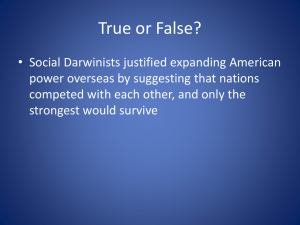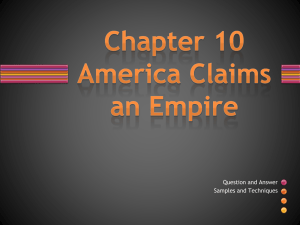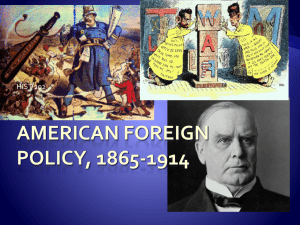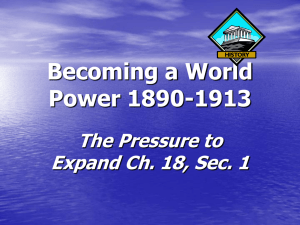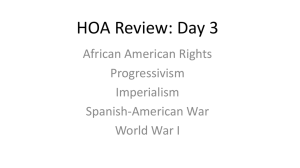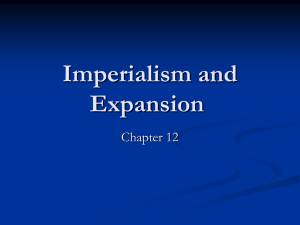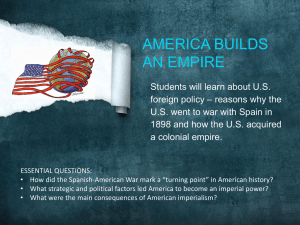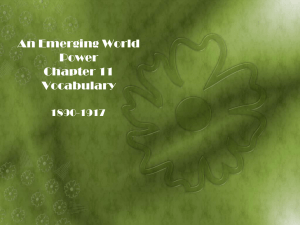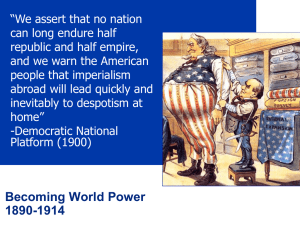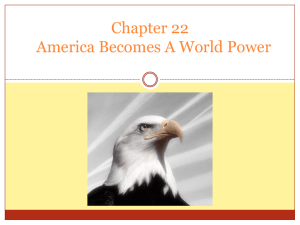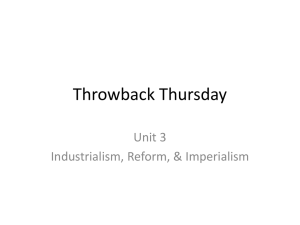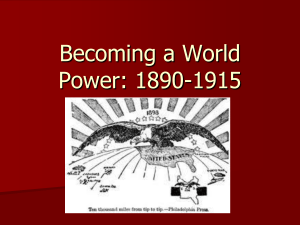APUSH_PP_CH_19_American_Imperialsim_2_17_2014
advertisement
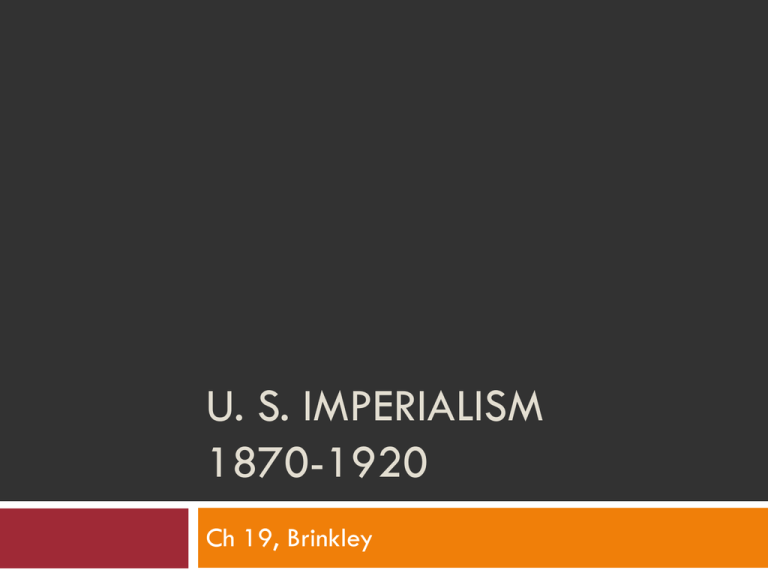
U. S. IMPERIALISM 1870-1920 Ch 19, Brinkley I. STIRRINGS OF IMPERIALISM There had been almost no expansion in the 20 years after the Civil War, but after 1890 the U.S. began to look toward territories overseas. What is “IMPERIALISM”? The policy that was common among Western European countries in the late 1800s of conquering African and Asian nations. Many politicians in America supported American expansion after the Spanish American War and this led to American involvement in Cuba, the Philippines, and Latin America. Had the US been an imperialistic nation from the very beginning? The New Manifest Destiny American Exceptionalism Manifest Destiny was the belief that the United States was destined to expand across North America from sea to sea. It has also been used to justify other territorial acquisitions (Cuba, Philippines, Hawaii, Samoa, Puerto Rico) as well as the belief in an American "mission" to promote and defend democracy throughout the world. Reasons Americans supported overseas imperial expansion in the 1890s: 1. U. S. had experience in exerting colonial control over Native Americans. Some historians have suggested that the US has been imperialistic and expansionist since the colonial period 2. The closing of the frontier led to a fear that America might have not have enough natural resources (land, timber, oil, coal…) 3. The increasing importance of trade due to rapid industrialization Depression of 1893 led some businessmen to look overseas for markets for the 4. Some felt that overseas expansion might be an outlet for the frustrations of the Populists and labor movements. 5. Americans were aware of imperialist fever in Europe. The major powers had divided up Africa and were now turning to Asia and China. Americans were afraid of being left behind and felt that nations with colonial holdings would gain the upper hand in military and economic power. Intellectual arguments for overseas expansion: 6. Social Darwinism Survival of the fittest nations “White Man’s Burden” Belief in the superiority of the Anglo-Saxon race 7. Some Americans felt sea power was very important to the future of the nation. Colonies would provide raw materials, markets, AND NAVAL BASES for a larger U.S. Navy. Admiral Alfred Thayer Mahan Alfred Thayer Mahan wrote The Importance of Sea Power Upon History, (1890). He said that countries with sea power were the great nations in history and the future of the U.S. depended on sea power=a strong NAVY. U.S. begins to take action…. 1. Latin America (1895) Border dispute between Venezuela and British Guiana (Britain) U.S. supported Venezuela, cited the Monroe Doctrine 2. Annexed Hawaii (1891) Queen Liliuokalani Pearl Harbor Sugar Production 3. Annexed Samoan Islands (1890s) Pago Pago 1898 Annexation Ceremony in Hawaii Samoan Islands, c. 1900 An important trade route and military base. The U.S. gained control of the harbor of Pago Pago. The Rock Dwayne “The Rock” Johnson is of Samoan descent. Famous pro wrester Tattoos covering the shoulder are of Samoan origin. Troy Polamalu http://www.history.com/videos/rooseveltfights-in-spanish-american-war II. WAR WITH SPAIN 1898—The war transformed America’s relationship to the rest of the world, and left the nation with a far-flung overseas empire. Yellow Journalism and the Spanish American War Joseph Pulitzer (Pulitzer Prize) William Randolph Hearst Spanish-American War: Reasons the U.S. Declared War 1. Sympathy for the Cuban rebels seeking independence from Spain 2. American press coverage of the conflict between Spain and her colony (Cuba) led to increased support for the Cuban rebels 3. Geography: the desire for U.S. dominance in the western hemisphere 4. de Lome letter 5. The Maine exploded in Havana Harbor. The U.S. blamed the Spanish. President William McKinley McKinley took a stronger stand against Spain and in 1898 the de Lome letter, stolen from the the Spanish ambassador in Washington, escalated tensions between the U.S. and Spain. The sinking of the Maine in Havana Harbor Theodore Roosevelt, Assistant Sec. of the Navy and avid imperialist HOW IT WASN’T Theodore Roosevelt in Cuba U.S. Forces Seized Control of the Philippines Spanish-American War: “A Splendid Little War” The war was short and American troops suffered few casualties. Treaty of Paris with Spain, 1898 1.Cuba was granted independence 2. Spain ceded Guam, Puerto Rico and Philippines to the U.S. ($20,000,000) 3. Theodore Roosevelt received national attention The Spanish American War and the U.S. Modern Military System Elihu Root, Sec. of War, suggested changes in the system…. INCREASED THE SIZE OF THE STANDING ARMY SET STANDARDS FOR THE NATIONAL GUARD SET UP OFFICER TRAINING SCHOOLS ***ORGANIZED THE JOINT CHIEFS OF STAFF TO ACT AS MILITARY ADVISORS AND PLAN FOR WAR What were the Terms of Treaty of Paris? 1898 Ended the Spanish-American War Cuba gained its independence Spain handed over Guam, and Puerto Rico, Philippines to the U.S. for $20 million Debate over the Annexation of the Philippines and Imperialism Imperialists T. Roosevelt Could not give it back Moral obligation Reinvigorate the nation Trade Ease of annexation Anti-Imperialists Imperialism was immoral Went against American ideals of freedom Racism against Asians Labor feared competition What was the PhilippineAmerican War? Emilio Aguinaldo and the Filipino Rebels rebelled against American control Philippine–American War --Americans fought Filipino rebels --lasted 3 years --200,000 Filipinos were killed, 4,000 U.S. soldiers died Philippines granted independence on July 4, 1946 What was the Significance of the Spanish-American War, 1898 The war transformed America’s relationship to the rest of the world, and left the nation with a far-flung overseas empire. McKinley, war, yellow press, Maine, war ends, assassination http://www.history.com/videos/mckinleyfaces-war-assassination III. THE REPUBLIC AS EMPIRE The new American empire created many challenges. The U.S. became involved in the politics Europe and Asia as well as a brutal war in the Philippines. Puerto Rico and the U.S. Foraker Act (1900) –gave U.S. the right to appoint Puerto Rico’s governor. Insular Cases (1901) –Supreme Court ruled the Constitution does not always apply to people in U.S. territories. “Constitution does not follow the flag” Congress granted citizenship to Puerto Ricans in 1917 Platt Amendment 1901 After the Spanish-American War the U.S. passed the Platt Amendment=barring Cuba from making treaties with other countries (U.S. has control over all Cuban foreign relations) and giving the U.S. the right to intervene in Cuba to maintain its independence and to protect property. The amendment also required Cuba to allow U.S. naval stations on the island. U.S Fleet at Guantanamo Bay, Cuba (1927) Guantanamo Bay, Cuba What is a Protectorate? Under the Platt Amendment, Cuba became a U.S. PROTECTORATE--a country whose affairs are partially controlled by a stronger power U.S. wanted to protect American property in Cuba: sugar and tobacco farms, mining, railroads, and public utilities U.S. and China: Open Door Notes (1899-1901) China was weak—”the sick man of Asia”—and U.S. was afraid stronger nations would cut them out of trade relations with China Open Door Notes—John Hay of U.S. wrote letters to leaders around the world proposing the nations should share trading rights with China Question: How important is U.S. trade with China “Open Door Policy” or “Open Door Notes” The issue: U.S. trade with China Under President McKinley and Secretary of State John Hay, the “Open Door Policy” on trade with China would allow the U.S. to trade with China without risking military involvement. How important is trade with China today? What was the Boxer Rebellion in China? (1901) A group of Chinese rebels called BOXERS rose up to wipe out “foreign devils”. Boxers resented Christian missionaries and their converts Boxers seized foreign embassies in Beijing, killed over 200 foreigners and took hostage. Troops were sent in to put down the rebellion. 100s died. Herbert Hoover (future president) and his wife were in China. Chinese Boxers Boxer Rebellion Boxer Rebellion, 1900 Imprisoned Boxers in Beijing who days earlier had been involved in the siege of the compound where Western diplomats lived. Boxer Rebellion: Firing Squad at the graves of those who died in Peking http://www.history.com/videos/engineeringan-empire-the-boxer-uprising America as a World Power Theodore Roosevelt’s Foreign Policy “Speak softly and carry a big stick.” The goal was to make nations think twice about fighting, thus promoting global peace . Theodore Roosevelt and “Big Stick” Diplomacy “Speak softly and carry a big stick.” (A strong Navy and military) The goal was to make nations think twice about fighting, thus promoting global peace. Actions T. Roosevelt took: Supported a stronger military Built the Panama Canal Issued the Roosevelt Corollary to the Monroe Doctrine “The World’s Constable” What was the Great White Fleet? In 1907, Theodore Roosevelt sent 16 battleships of the U.S. Navy around the world to showcase the nations military might. Military might was the force behind Roosevelt’s “Big Stick” diplomacy. “Great White Fleet,” 1907-1909 Map of Great White Fleet’s Voyage Welcoming the Greet White Fleet to New Zealand http://www.history.com/videos/rooseveltsbig-stick-foreign-policy Why did the US Build the Panama Canal? Theodore Roosevelt acquired the Panama Canal zone in 1903. He and others believed the construction of the canal was vital to American world power. The canal served both military and trade purposes by providing a shorter route from the Atlantic to the Pacific Ocean. U.S. gave control of the canal to Panama in 1999. http://www.history.com/videos/guts--boltspanama-canal---locks What was the Roosevelt Corollary to the Monroe Doctrine? 1904 ****Roosevelt Corollary to the Monroe Doctrine: Warned European nations that the U.S. would now use force to protect its interests in Latin America (Western Hemisphere) Describe U.S. Foreign Policy in Latin America from 1910-1920 1910-1920 the U.S. intervened in Latin America several times: 1. Sent troops to put down rebellion in Nicaragua 2. Sent Marines to Veracruz, Mexico 3. U.S. forces under John Pershing entered Mexico to try to capture Poncho Villa Territories held by the U.S. today…. SO WHAT….THE BIG QUESTIONS 1. What kind of nation are we? What kind of nation do we want to be? 2. Is imperialism and expansion ALWAYS wrong? 3. Critics of US world power describe American dominance as arrogant chauvinism…what about the spread of communism or radical Islam? What about countries who embrace and adopt Am culture on their own? How is the US to react when countries ask for support? 4. What is the relationship of America to the rest of the world? How has it changed? 5. Should the US or any nation dominate other people against their will? What kind of nation are we? Critics of U.S. world power….
